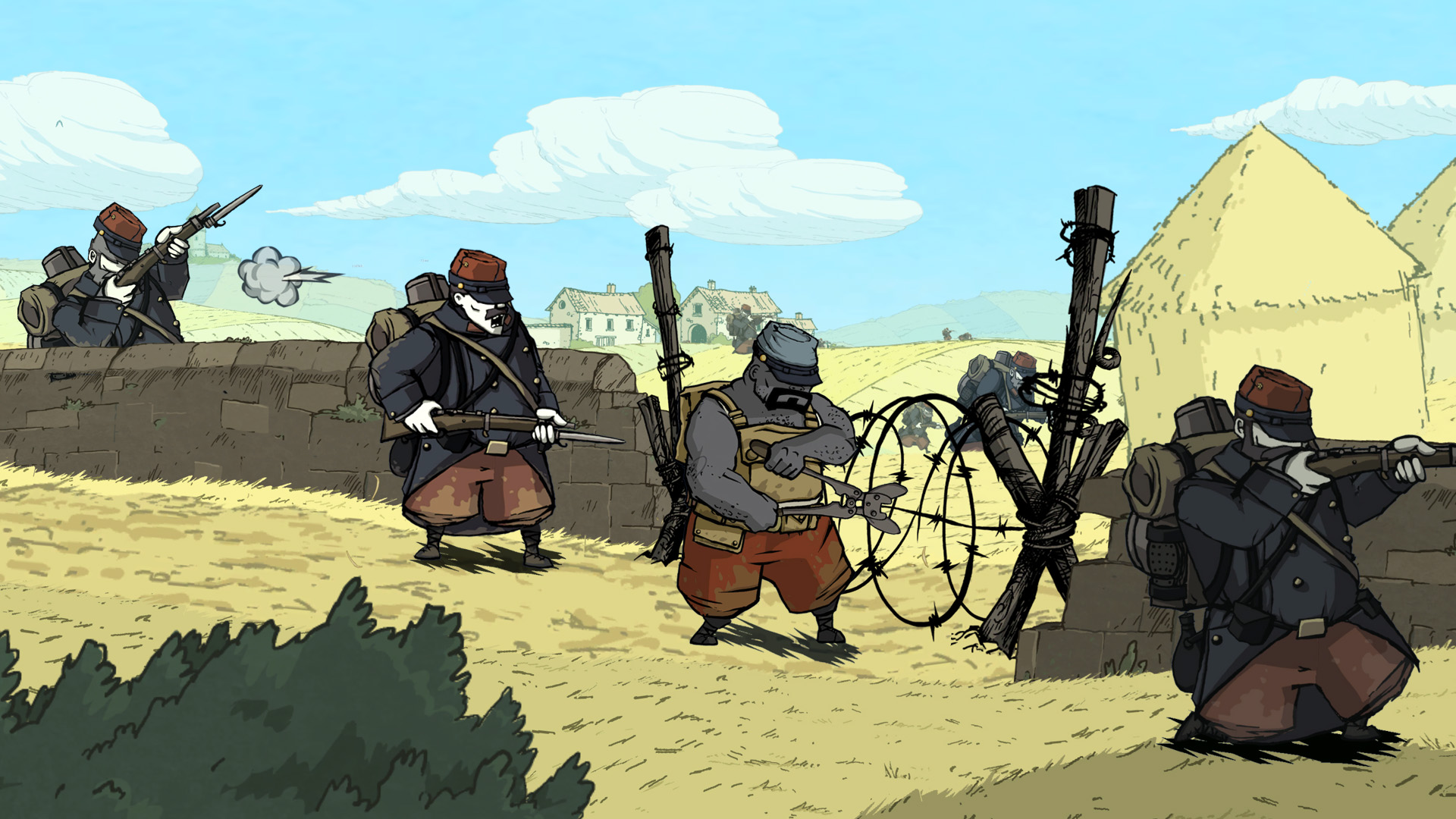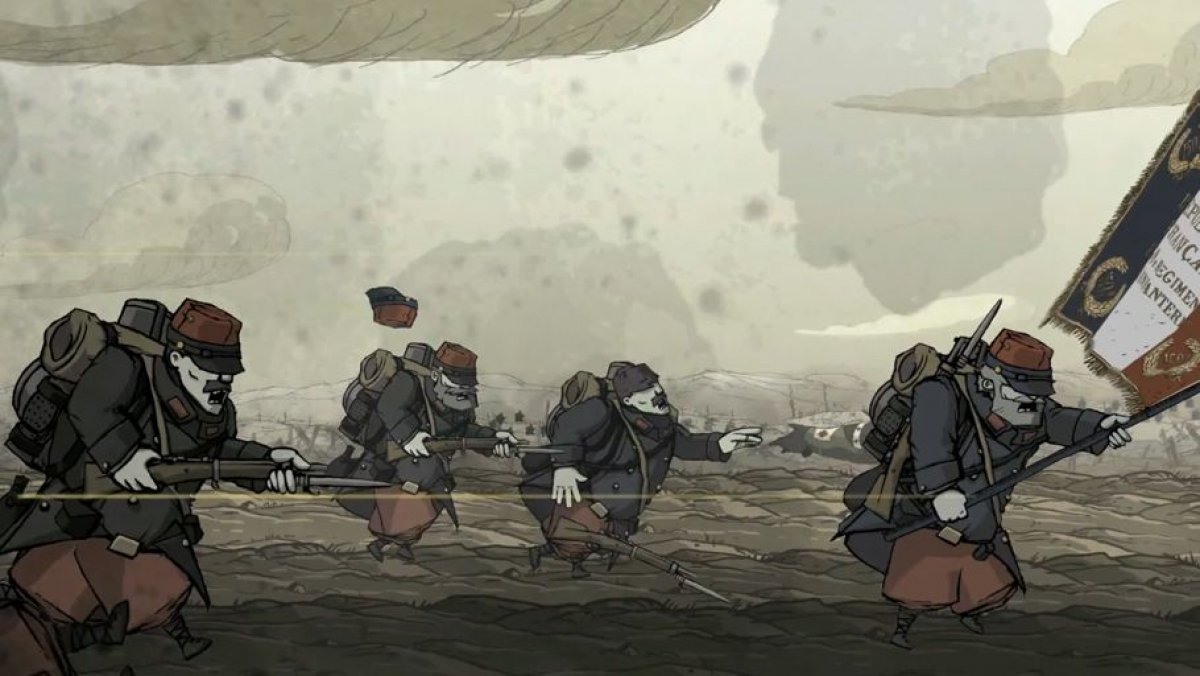Crosspost von The Nerdstream Era.
Can you make a game about World War I? An adventure game, no less? Ubisoft tried its hand at it. The result is a game called "Valiant Hearts", built on the Rayman2-engine, that was released end of June. The concept is a daring one: You experience the first World War from the perspective of an aging French conscript, Emile, his German son-in-law, Karl, a Belgian nurse, Anna, and an American volunteer, Freddy. The game jumps between these characters as they meet and advances three years through the war. The question remains, though - is it possible to adequatly convey the horrors of the war in a comic-style adventure game? The answer is Yes, at times.
Can you make a game about World War I? An adventure game, no less? Ubisoft tried its hand at it. The result is a game called "Valiant Hearts", built on the Rayman2-engine, that was released end of June. The concept is a daring one: You experience the first World War from the perspective of an aging French conscript, Emile, his German son-in-law, Karl, a Belgian nurse, Anna, and an American volunteer, Freddy. The game jumps between these characters as they meet and advances three years through the war. The question remains, though - is it possible to adequatly convey the horrors of the war in a comic-style adventure game? The answer is Yes, at times.
Emile is a farmer in France, whose German farmhand, Karl, has a little son with his daughter Marie. When the war breaks out, Karl is thrown out of France and conscripted in the German army, while Emile is conscripted in the French one. Emile meets Freddy, an American who volunteered into the French army to avenge the death of his French wife, killed by the evil Baron von Dorf. Anna's father, a scientist, was abducted by von Dorf to develop new and deadly weapons. Through the events of 1914-1917, the characters are drawn together and seperated by the waving fortunes of war.
The gameplay is pretty simple: you command your figure to move left or right, hit objects with your fist or shovel, and interact with other objects. In many levels, you can also command your dog companion to fetch items or pull levers. You can always carry exactly one item, which can also be thrown. The levels either require you to solve a series of simple puzzles most of the time involving machinery with gears and levers or to escape death in equally simple reaction games. Clearly, the gameplay isn't the core of the game and serves more to transport a certain mood or plot.
 |
| Press Space to cut wire. |
For example, when the Germans first use Chlorin Gas in 1915, Emile needs to find the underground machine pumping it out, redirecting the vents so the gas is blown at the Germans. When Anna patches someone up, you have to push keys in a quick succession as to complete the healing process. In one level, you drive a tank and have to shoot at mines and planes before they hit you. Anna, commandeering a civilian car, has to evade roadblocks and enemy by driving left or right at the right time.
 |
| Just like the real thing. |
The focus, therefore, lies on the narrative. There is no spoken dialogue and only occasional voice-over narration. The game instead relies on gibberish sounding French, German or English, with the occasional real words thrown in between, and the bubbles over the characters heads with symbols depicting what to do. An officer, for example, might shout at you with an arrow to the right in the bubble over his head, so you know you have to walk right. This becomes a tad more complex when you get instructions on what puzzle to solve, but it never really gets anywhere near "difficult".
 |
| I guess he wants me to oil the dog. |
The style of the graphics is very comic-y, obfuscating the eyes of the characters and pronouncing their torsos and heads over the lims, creating a very distinct style. It serves the scenario well enough, and the engine is able to convey colorful towns as well as the bleak mud stretches of the trenches. The music is also very underplayed, supporting rather than dominating the scenery. When in the trenches, you often see soldiers collapsed, dead, wounded or looking absently into the void. This creates a very vivid and depressing image of the trenches despite the seemingly jolly art style, a cognitive dissonance that is very welcome. There are also lighter scenes, like soldiers celebrating in town.
These stylistic decisions work best for Emile's and Karl's storylines. Anna never gets to the trenches, instead raoming the countryside and aiding soldiers of both sides as necessary. The most tonally off sequences involve Freddy and Baron von Dorf. Both are totally over the top (especially von Dorf's ludicrous arsenal of super weapons that belongs more into the Indiana-Jones-Nazi-variety) and don't really fit tonally. Their storyline is also ended at about two-thirds in the game in an abrupt and entirely unexplained turn of events that seems very unfinished. Freddy's superhero-antics mercifully stop then, making more room for the more realistic feeling of Karl and Emile, whose personal story is much more touching than Freddy's.
 |
| Defeating von Dorf's Zeppelin, one handgrenade at a time |
It is in these moments that the dissonance of tone becomes a much bigger, more disrupting. It is then not the First World War anymore, but some kind of fantasy land more reminiscent of "Tannhäuser" than of the reality. These parts of the game should have better been excluded in favor of more Emile and Karl.
In its strong moments, however, the game can really touch you and convey the feeling and hopelessness of the war. In one of the last sequences, for example, Emile takes part in the Neville offensive, one of the biggest and most futile bloodbaths in the war. You have to go through a sheer endless variance of trenches, survive bombardements and MG fire, without any objective that would make any sense. The officer just commands you to go on as your comrades die around you. The whole loss of purpose is masterfully captured in this sequence (which ends in the soldier's mutiny). Another strong scenario involves the tunnel warfare where Emile rescues a German soldier, has to solve some puzzles with him (that require two people) and is then rescued by him, only to be forced to kill him later.
On the other hand, scenarios like the capture of Fort Douamont are too focused on the bravery of the soldiers and drip of pathos. The same is true for much of the voice-overs. The developers were too hesitant of making a true anti-war-game, trying to have it both ways. This is almost certainly better for sales, and if it is the price to educate the youth about this conflict, I guess we have to be willing to pay it. But it stands in the way of true artistic greatness, since it continually diminishes the message of the stronger, more emotional sequences.
In the end, though, I can only recommend the game. It has its flaws, but it's a brave experiment that needs to be rewarded and is generally touching and even entertaining most of the time. Plus, there isn't exactly a host of World War I games laying around.






Die römischen Könige sind spannende Themen für jede wissenschaftliche Analyse. Mit hausarbeit schreiben lassen an der Seite wird das Schreiben einer Arbeit zu diesem historischen Stoff nicht nur einfacher, sondern auch klarer strukturiert und inhaltlich fundierter.
AntwortenLöschen